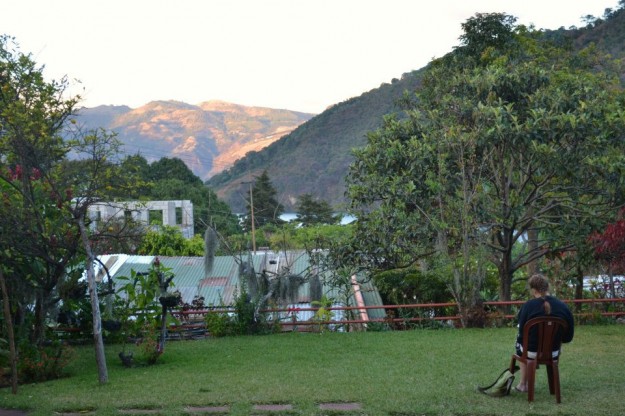cath
Paige Patet, ‘13, English and COJO
I know how to ask three questions in Spanish: What is your name?, How old are you?, and Where’s the bathroom? So when I exited the Guatemalan airport alongside my fellow VISION participants with three weeks of sunshine, black beans, and cockroaches ahead of me, I was nervous. On a trip that is intended for students to explore their spiritualties, how could I continue my search if I couldn’t even understand the community I was living with or even the readings at mass?
I remember asking myself this question early on in the trip while sitting on the roof of our hotel. I looked out at Lake Atitlan and the mountains surrounding us. The wind blew empty bottles positioned on standing stakes rattling them like marimbas. The sun slowly dipped in a sky of pinks and oranges. In that moment I could perfectly understand God’s presence
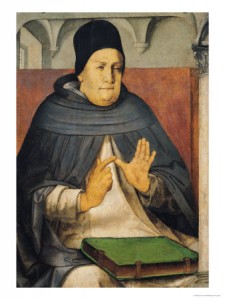
Posted by Monica Stiles, ’12 Psychology and Catholic Studies
On Saturday, January 28, the Church celebrated the feast day of St. Thomas Aquinas. As students at a liberal arts University, we have a lot to thank Aquinas for. His work with philosophy and theology has shaped much of not only what the Church teaches, but also even some secular views of morality and ethics. We are so blessed to have such a brilliant, impactful, and holy man as our patron.
As a Catholic Studies student with a relative understanding that this world is so much greater than what any human’s intelligence can grasp, starting yet another semester makes one sometimes want to quote what Aquinas said after giving up writing, “I cannot go on…. All that I have written seems to me like so much straw compared to what I have seen and what has been revealed to me.” (http://www.americancatholic.org/features/saints/saint.aspx?id=1274). Now, I would venture to guess that what has been revealed to me has not been quite as great
![DSCN1145[1]](https://blogs.stthomas.edu/cathstudies/files/2011/12/DSCN11451-625x468.jpg)
Some words from our Rome Blogger, Alison Coffman ’12
There were no classes last Thursday. Shops were closed; people had a day off from work. All for the national holiday—the Immaculate Conception.
Now to what degree the celebration is cultural vs. religious is out of my scope, but, regardless, it was interesting to experience what it’s like to live in a not completely secularized country.
So what was it like? A party was thrown in Mary’s honor across the city. I went to the beautiful church Santa Maria del Popolo (Saint Mary of the People), which was a fitting place to go given that people were streaming in and out of the churches every hour for mass. The piazzas were crowded with people. On one of the busiest streets, Via del Corso, all of the church doors were thrown open, and people were pouring in and out to pray and light candles. I took the photo above as I was walking down Via del Corso. I was just struck by the serenity of Mary, watching the people as they swirl by on the street.
But the center of the party was Piazza di Spagna. There’s a large obelisk/column with a statue of Mary on top, and so every year the firemen of Rome get out their huge ladders to place a wreath of flowers on her arm. The base of the column is just covered with flowers, wreaths, and bouquets that people leave. Then, to crown the day, the Pope makes his annual appearance at the Piazza. I waited for two hours to get a prime spot, and it was well worth it. There was a wonderful sense of unity when the crowd prayed the Rosary during the last half hour of the wait. Pope Benedict XVI, or “Papa Bene,” gave an address about the Immaculate Conception based on the daily reading from Revelation.
All I can say is that the Italians really know how to celebrate Mary in style.
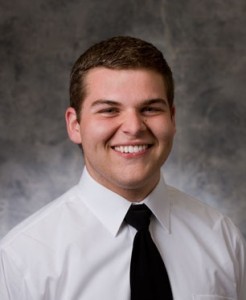
Written by Talyor Leffler ’13, Philosophy and Catholic Studies
Five years ago, I had a make-believe conversation in my head with those little old ladies during Vocation Awareness Week. They would say, “Young man, you would sure make a good priest,” to which I would respond, “You’re crazy, ma’am. Please go pick on someone else. That’s the last thing on earth I would spend my entire life suffering through.” Today, I’m studying to be a Catholic priest.
Written by Gemma Shaffer ’14, Biochemistry and Catholic Studies
Last year as a freshman, when I heard that the Catholic Studies department was going to put on a talent show, I thought to myself, “Eh, it will probably be a bunch of lame skits and stuff, but hey, it might be fun.” Much to my surprise, that night I discovered that the students in the Catholic Studies department did indeed have talent, far more so than I think anyone expected. This year when talent show time rolled around, I thought, “This will be good, but there’s no way it could top last year’s.” Once again, I was wrong.
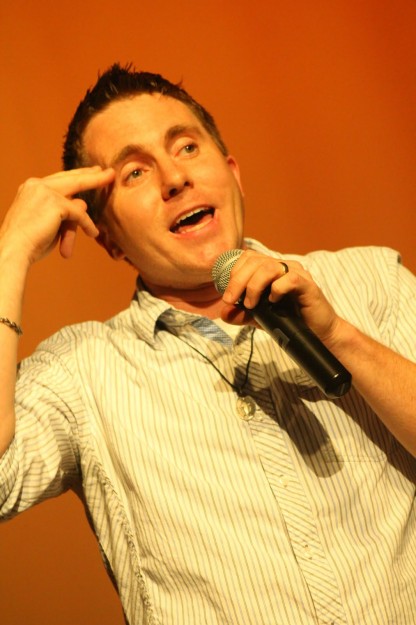
Pictured above: Jason Evert
Written by Harry Welsh ’14, Business Managment Major
On November 8th, UST’s campus was blessed with the opportunity to have Jason Evert come speak about chastity. Jason Evert is an internationally known, dynamic, and engaging speaker on chastity, relationships, romance, and purity. He has a master’s degree in theology, and undergraduate degrees in counseling and theology, with a minor in philosophy at Franciscan University of Steubenville. He is the author of more than ten books, including If You Really Loved Me, How to Find Your Soulmate Without Losing Your soul, and Theology of the Body for Teens, which challenge young people to be pure.
Listening to his talk, a few things stood out to me most. First, women in society are displayed in media more as objects than as human beings with dignity. Being men on a college campus, we are not only constantly surrounded by beautiful women on campus, but also by the skewed image of women that is in the media; there are temptations all around us. As a man at the talk
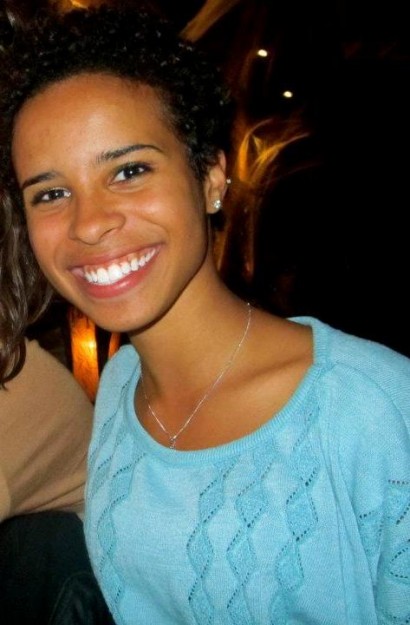
Written by Justina Hausmann ’13, Neuroscience and Catholic Studies
When I transferred from DePaul University during my freshman year, I have to admit I had high expectations for the University of St. Thomas. I surely was not going to transfer again, so this just HAD to be good. While I did enjoy my first semester as a Tommie, I was hungry for more, for more Christ, for more community. I wanted to feel like this campus was mine. It was this hunger that led me to Catholic Studies.
This year, I was asked to join a Bible study through the group Living the Word: Scripture Studies
Written by Corey J. Stephan ’15, Theology Major 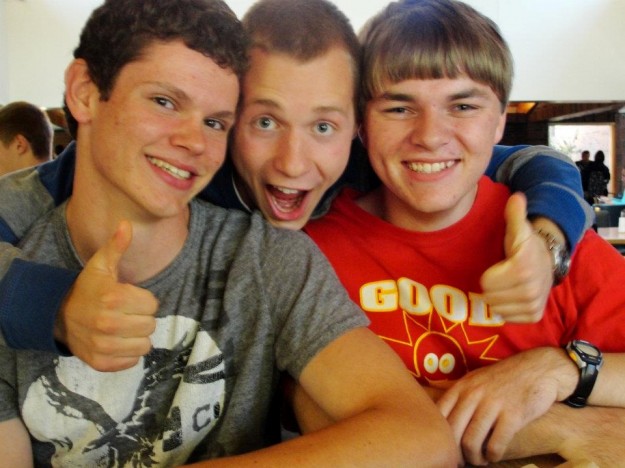
Three Catholic Men’s Floor residents. From left to right: Aaron, Corey (me), & John
The University of St. Thomas is a wonderful, well-respected institution of higher learning with a strong Catholic heritage. That heritage is not merely something pleasant to read in a brochure; the faith on campus thrives at this very moment. As an incoming freshman, I knew that I wanted to be a part of the Tommie Catholic Christian community. I deeply appreciate the Holy Spirit’s heavy hand in bringing me to study at this school, and I know that He also guided me in choosing where to live — the Catholic Men’s Floor.
Living on Ireland Hall’s 2 North, the Catholic Men’s Floor, has made me a part of the best Christian brotherhood for which I could have asked. Every night, a group of fellow floor residents
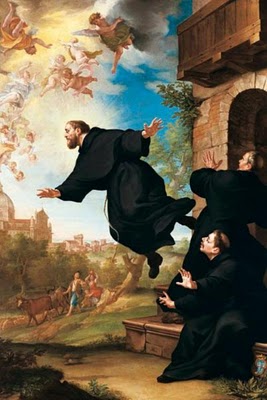 Feeling stressed and nervous about your midterm examinations? Well, here is a study tip: ask for the intercession of our wonderful saints! One in particular to be pointed out when taking tests is St. Joseph Cupertino. Here is his story.
Feeling stressed and nervous about your midterm examinations? Well, here is a study tip: ask for the intercession of our wonderful saints! One in particular to be pointed out when taking tests is St. Joseph Cupertino. Here is his story.
St. Joseph was born at Cupertino, in the diocese of Nardo in the Kingdom of Naples, in 1603. His mother considered him a nuisance and treated him harshly. Joseph soon became very slow and absent-minded. He would wander around, going nowhere, his mouth gaping open. But he had a bad temper, too, and so, he was not at all popular. He tried to learn the trade of shoemaking, but failed. He asked to become a Franciscan, but they would not accept him. Next, he joined the Capuchins, but eight months later, they sent him away because he could not seem to do anything right. He dropped piles of dishes and kept forgetting to do what he was told. His mother was not at all pleased to have the eighteen-year-old Joseph back home again, so she finally got him accepted as a servant at the Franciscan monastery. He was given the monks habit and put to hard work taking care of the horses. About this time, Joseph began to change. He grew more humble and gentle, more careful and successful at his work. He also began to do more penance. Now, it was decided that he could become a real member of the Order and start studying for the priesthood. Although he was very good, he still had a very hard time with studies. The examiner providentially asked him to explain the ONLY thing he knew well, and so he was made a deacon, and later a priest.

